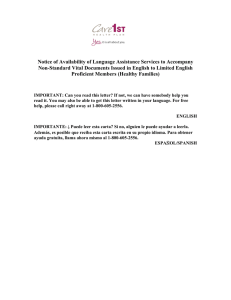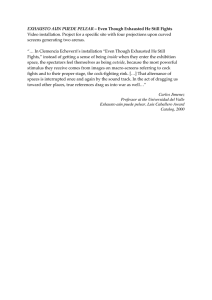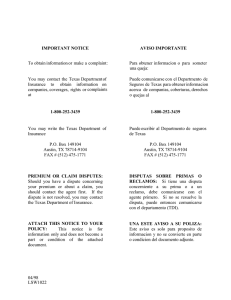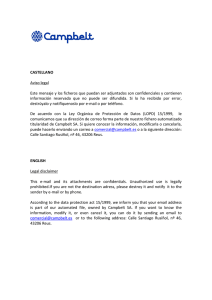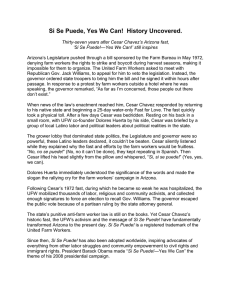The verb "can" has no infinitive (no "to can ") is only present ("can
Anuncio
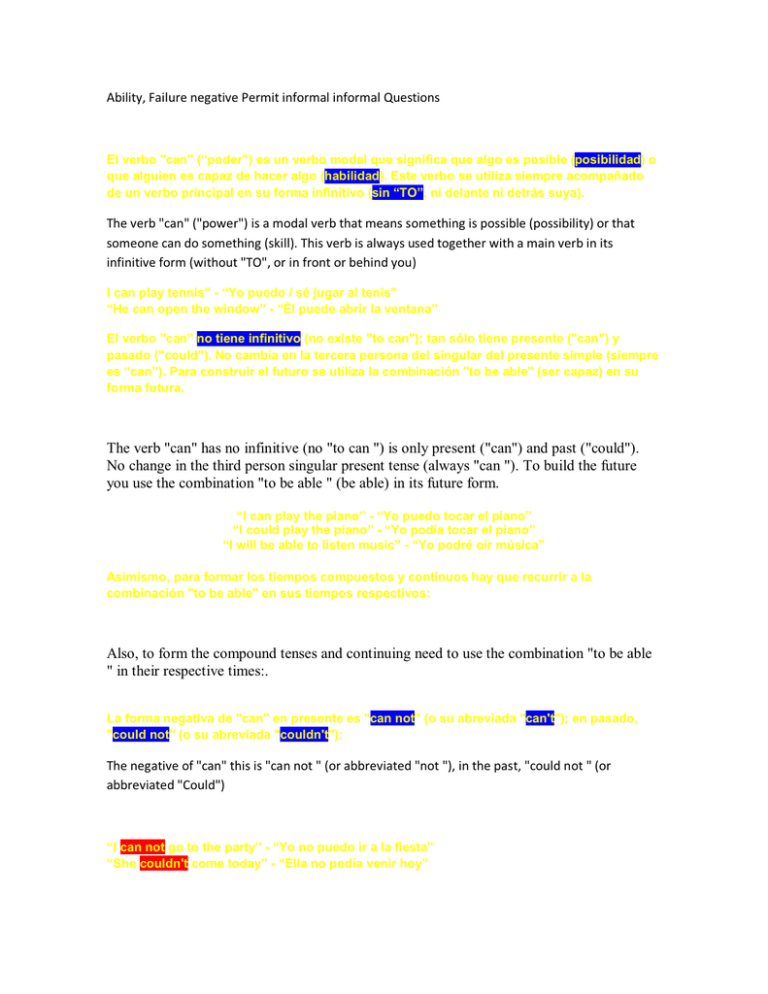
c @ @ ! " ! #$%&' ( ) )#* @ + , - ! . / - The verb "can" has no infinitive (no "to can ") is only present ("can") and past ("could"). No change in the third person singular present tense (always "can "). To build the future you use the combination "to be able " (be able) in its future form. " ! #$ " ! #$0 ") #$&01 2 ! ! - 3 Also, to form the compound tenses and continuing need to use the combination "to be able " in their respective times:. - 4, 43 ! " !#$ 5 4!#@ 0 ! @ "#$ % & ' ( ¢n interrogative sentences, "can" and "could" be placed at the beginning of the question (work, as in the negative, as an auxiliary verb): 6 !)7#8/1 7 6 )97#8/ '7 [ [ [ [ is a modal verb. [ is used to express ability or to say that something is possible. [ is the same for all subjects. We don't add an 'S' in the third person (like other verbs) The verb that comes after [ is in the infinitive without : ¢ 2 Spanish. (= it is possible for me to speak Spanish = ¢ have the ability to speak Spanish) |p _e 2 well. |p We 2 my neighbour in the garden. |p They the guitar. |p To form the negative we add "" after to form one word: . We can also contract the negative to form (can't = cannot) |p |p ¢ the piano. We ÷ to the cinema tonight. She 2 French very well. _e ! a car. O To from the question we change the position of the subject and the auxiliary verb. The main verb is still in the infinitive without . |p |p |p |p Where ¢an ice-cream? [ ¢ ÷ to the party, please? [ you 2 Japanese? What we ! on Saturday? Remember that you can use short answers: |p |p [an ¢ sit here please? h . [an you speak [hinese? . [ Sometimes h and [ are impersonal and refer to people in general. |p h see many stars at night from here. (= people in general can see many stars) ¢t doesn't necessarily refer to you but people in general. |p h run naked in the middle of the street. Not necessarily saying YOU can't run naked in the middle of the street but in general it is not possible for anyone. Try our [an - [an't - [annot Game. ¢f you found this information about [an useful, share it with others: [an es un verbo modal. ¿Puede se utiliza para expresar la capacidad o decir que algo es posible. [an es el mismo para todas las materias. No añadimos una 'S' en tercera persona (como otros verbos) El verbo que viene después se puede está en el infinitivo sin to: * Yo puedo hablar español. (= Es posible para mí hablar en español = Tengo la habilidad de hablar español) * Se puede nadar bien. * Podemos ver a mi vecino en el jardín. * Se puede tocar la guitarra. Negativo Para formar el negativo se añade "no" después se puede formar una palabra: no se puede. También puede contraer la negativa a la forma no puede. (No se puede = no) * No puedo tocar el piano. No podemos ir al cine esta noche. * No puede hablar muy bien el francés. Él no puede conducir un coche. Preguntas Para la pregunta que nos cambia la posición del sujeto y el verbo auxiliar. El verbo principal se encuentra todavía en el infinitivo sin to. * ¿Dónde puedo comprar un helado? * ¿Puedo ir a la fiesta, por favor? * ¿Se puede hablar japonés? * ¿Qué podemos hacer el sábado? Recuerde que puede utilizar respuestas cortas: * ¿Me puedo sentar aquí, por favor? Sí, puede. * ¿Puede hablar chino? No, no puedo. ¢mpersonal puede A veces usted puede y usted puede ...? son impersonales y se refieren a las personas en general. * Usted puede ver muchas estrellas en la noche de aquí. (= Gente en general se pueden ver muchas estrellas) No se refiere necesariamente a usted, pero la gente en general. * No se puede correr desnudo en medio de la calle. No necesariamente decir que no puede correr desnudo en medio de la calle, pero en general no es posible para cualquier persona. Pruebe nuestro [an - No se puede - El juego no se puede. Si has encontrado esta información acerca de [an útil, compartirlo con los demás:
